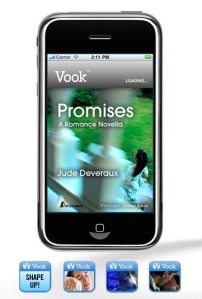What the heck is a VOOK?
It’s been all the buzz in the publishing industry lately. Apparently (and I haven’t seen it yet) it’s a digital book with video. The books are mostly short, with fiction and non-fiction titles including a couple written by bestselling authors specifically for the new technology.
We’ve come a long way from Gutenberg’s machine.
The Vook is just one of what promises to be a whole slew of new technologies that the publishing world is trying in an attempt to make books sexier, more accessible and appealing to the digitized world.
But what are all these enhancements really adding to the reading experience?
I remember when reading required no more electricity than it took to power a light bulb; and the only sounds it made, besides my own breathing, were the voices of the characters in my head. I relish that silence and the simplicity of reading. So perhaps I’m in no position to judge.
Perhaps the issue now is to adjust our concept of the activity we call “reading” in the first place. Is it still reading when it talks and moves? Or is it some new form of entertainment? When television was first developed, they came up with a whole new word to describe it. It was entirely different from theater and movies. So is this Vook a variation on a theme or some new species? Someone please enlighten me.
And, speaking as a creator of stories using only words, how do individuals create for this new technological entity? It’s no longer the work of a single-minded writer. A Vook, or any other digitally enhanced version of a book, requires a team with digital expertise, expensive equipment, a cast of actors and, most importantly, a budget. The beauty of writing for me has been (among other things) that I could go open my .doc file or a spiral-bound notebook anytime and anywhere I liked, and simply go to work. I could do it all by myself, hour after hour indulging my imagination; and when I was finished, I had created an entire world.
In this rapidly changing literary landscape, how long will that last? At the most basic level, it feels to me like an inalienable right for one person to ink their innermost imaginings onto a page using no more specialized knowledge than good basic writing skills, time, practice and sheer determination.
But perhaps my questions are moot. As technology has a tendency to become rapidly user-friendly, I can easily imagine a not-too-far-away future when all our kids will be making Vooks on their laptops during recess. But for now, for me, the singular experience of self-expression that writing has been seems under threat of extinction.
If I’m a dinosaur, then so be it. (May future readers love my words as well as my kids love the dinosaurs at the Museum of Natural History!)



